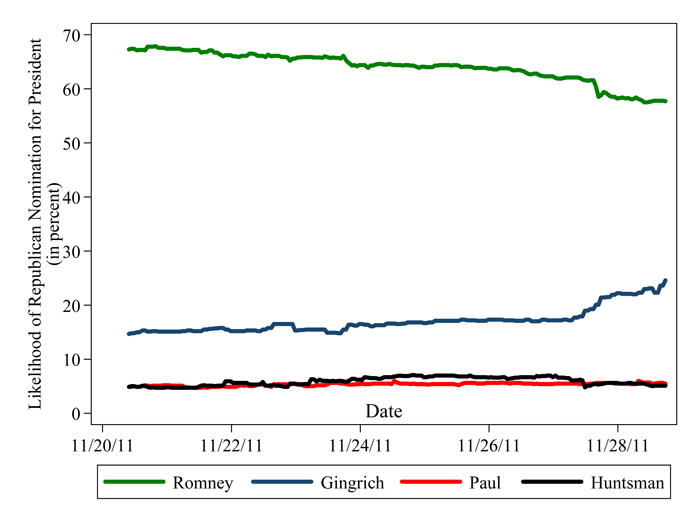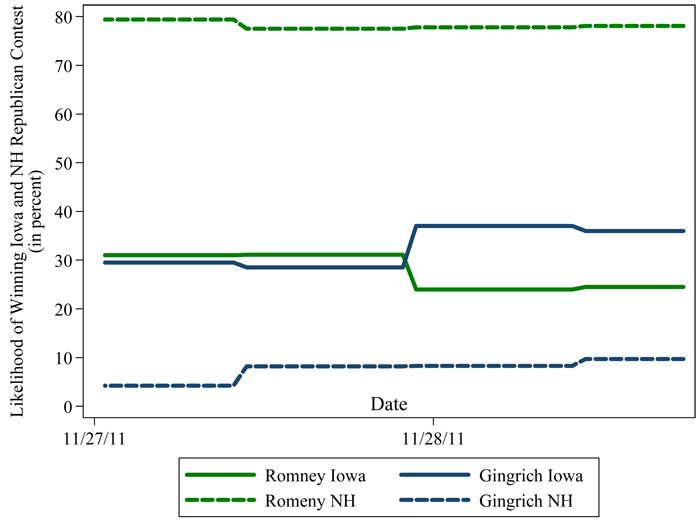People are starting to bet on Gingrich
Newt Gingrich has had a strong two days, moving from long-shot to viable long-shot in his bid for the Republican nomination.
The prediction markets now give him a 24.6 percent likelihood of the nomination, still trailing Mitt Romney who has a 57.4 percent likelihood of the nomination.
The chart shows the likelihood of winning the nomination for the four most likely candidates during the past week. Ron Paul at 5.5 percent and Jon Huntsman at 4.9 percent continued to jockey for third place in the hope of becoming the next anyone-but-Romney candidate. Romney had a slow downward trajectory all week, but Gingrich had a slight upward trend all week before rocketing up late morning Sunday into Monday.
The Union Leader endorsement of Gingrich came a few hours before his surge in the prediction markets. The endorsement itself, from the very conservative paper, is not extremely strong. The paper starts its final paragraph with, "Newt Gingrich is by no means the perfect candidate." Further, the Union Leader has had a mixed record in the performance of its chosen nominees in New Hampshire.
Yet, Nate Silver argues in the New York Times that we should not judge the endorsement on whether the candidate wins, but on whether the candidate gains in the New Hampshire polls.
The markets tell a different story: The endorsement's biggest benefit will not be in New Hampshire at all. It will be in helping Gingrich become the final anyone-but-Romney candidate. The right wing Daily Caller noted this possible benefit; it quotes Republican consultant Dan Hazelwood that "[the endorsement] is a blow to everyone [else] trying to be the anti-Romney."
The chart shows the likelihood of winning the Iowa and New Hampshire primary contest for Gingrich and Romney over the last two days. The likelihood in New Hampshire moved slightly on Sunday morning, but is very flat. Romney is still in complete control with 78.1 likelihood of victory. Not shown on the chart, the race for second place in New Hampshire also is steady, with Gingrich leading with 39 percent likelihood. Yet, the likelihood in Iowa has changed dramatically, with Romney's small lead now a large lead for Gingrich (36.0 percent to Romney's 24.5 percent).
A victory in Iowa would boost Gingrich up even further; it would likely cement him as the final anyone-but-Romney candidate. Since people already expect Gingrich to do well in Iowa, it is unlikely to propel him past Romney in New Hampshire. Romney would likely still win New Hampshire, with Gingrich second, and then the race would likely proceed as a two person contest.
If Gingrich loses Iowa, there are still two possible outcomes. First, Romney could win, win New Hampshire and build massive momentum that carries him to a quick victory. Second, Romney either wins or loses Iowa, but gains little in the race because the Republican electorate chooses one last anyone-but-Romney candidate.
David Rothschild is an economist at Yahoo! Research. He has a Ph.D. in applied economics from the Wharton School of Business at the University of Pennsylvania. His dissertation is in creating aggregated forecasts from individual-level information. Follow him on Twitter @DavMicRot and email him at thesignal@yahoo-inc.com.
Other popular Yahoo! News stories:
It's the stock market, stupid? Why Obama is no longer the underdog
DNC attacks Mitt Romney as a flip-flopper in new ad
Why Newt Gingrich is a different type of anyone-but-Romney candidate
Want more? Visit The Signal blog or connect with us on Facebook and follow us on Twitter.




